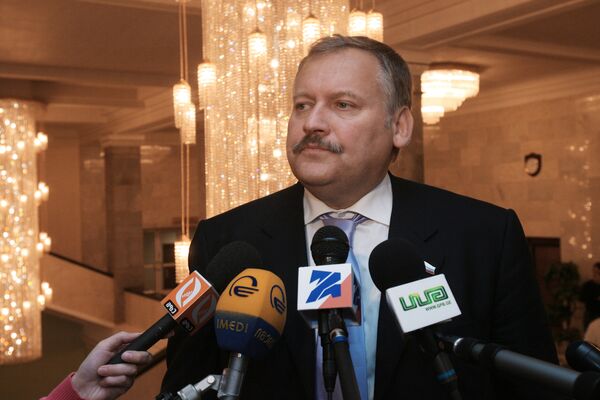The Belarusian opposition should bear responsibility for the violence that blemished Sunday's presidential elections in the country, pro-Kremlin United Russia party member Konstantin Zatulin said on Monday.
"The opposition had no big illusions [regarding the polls] from the very beginning, although they tried hard to show that they had a chance, by means that are beyond any criticism," said Zatulin, deputy head of the Russian parliamentary committee in charge of relations with the Commonwealth of Independent States (CIS).
Preliminary results of Sunday's polls show that long-serving incumbent president Alexander Lukashenko gained a landslide victory over his opponents, winning 79.7 percent of the vote. His closest rival, opposition candidate Andrei Sannikov, received a mere 2.56 percent.
"On the day of elections, one of the candidates said in a TV broadcast that the opposition had gained up to 40 percent of the vote, while Lukashenko garnered some 25-30 percent, which was absolutely untrue," Zatulin said.
"With this wishful thinking, while trying to draw the attention of the international community, the opposition - at least its radical part - has broken all barriers. This is how I explain what happened near the Parliament," the politician said.
Thousands of protesters took to the streets in Minsk on Sunday claiming that the polls were rigged. Police brutally dispersed the demonstrators when they tried to storm Parliament. Several presidential candidates were injured in clashes, and one, Vladimir Neklyaev, received a head injury as a result. At least 600 protesters were detained.
Zatulin said that Russia could not support opposition demonstrations in Belarus since it, too recently played host to race-hate riots aimed at destabilizing the situation in the country.
"One can like it or not, but the Belarusian people have expressed their will," Zatulin said. "Of course we would like to have a more concessive partner than Lukashenko, a less hard-line, conceited and conflict-orientated one, but we have one that has been elected in Belarus, who we now have to respect and to work with during the next [presidential] term."
CIS observers described the elections as "transparent," but the Organization for Security and Cooperation in Europe (OSCE) said the vote count was flawed and condemned the heavy-handed approach of the Belarusian police to the protests.
"This election failed to give Belarus the new start it needed," OSCE observer mission head Tony Lloyd said. "The counting process lacked transparency. The people of Belarus deserved better. And, in particular, I now expect the Government to account for the arrests of presidential candidates, journalists and human rights activists."
The United States condemned the electoral violence, including the attacks on presidential candidates and violence against journalists and civil society activists. European Parliament President Jerzy Buzek said he was "shocked" by the "outrageous and disgraceful" attack on Neklyayev and called on Lukashenko to punish all those involved in the violence.
Zatulin criticized the West for constantly changing its position toward Lukashenko "for political and agenda-driven reasons."
After the police suppression of demonstrations in Minsk during the 2006 elections, Western powers labeled Lukashenko "Europe's last dictator," but as soon as Russia expressed concern over the situation, they quickly switched to voicing support for him, Zatulin said.
"It seems that friendship or non-friendship between Russia and Belarus is the matter of concern for them, not the essence of Belarusian democracy," he said.
MOSCOW, December 20 (RIA Novosti correspondent Maria Kuchma)


